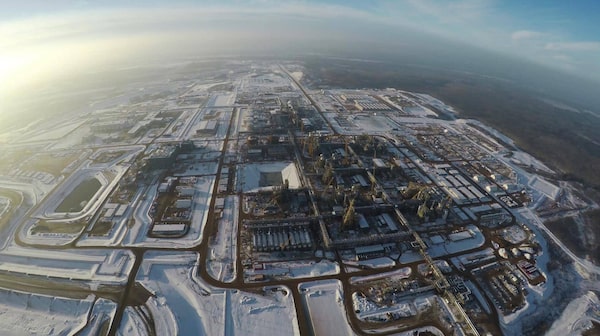
An aerial shot of the Fort Hills oil sands project. The Calgary-based company says the 194,000-barrel-a-day project remains on track to start up this year, even after partner Total SA cut off funding.Phoenix Heli-Flight
Oil patch spending is likely to stay flat as U.S. crude prices languish around $50 (U.S.) a barrel and the outlook for Canadian natural gas darkens.
Major producers are set to report financial results for the three months ended Sept. 30 this week, but the numbers are bound to be overshadowed by questions over pipeline snarls and drilling prospects for the year ahead.
U.S. and global oil prices have been buoyed by production cuts orchestrated by the Organization of the Petroleum Exporting Countries and strong demand from refineries, which have soaked up inventories as drilling activity in the U.S. shale patch slowed.
While still far from highs reached in mid-2014, crude has climbed to levels that offer a semblance of stability to producers shaken by a once-in-a-generation slump. U.S. West Texas intermediate oil averaged $48.20 a barrel in the third quarter and on Friday traded around $52.
"Around the $50 level they can cope," said Victor Vallance, senior vice-president at credit-rating agency DBRS Ltd. "But there are a number of challenges and risks going forward."
Headwinds include renewed strength in the loonie and natural-gas prices that have sunk to multiyear lows, the result of booming supply, despite the pipeline outages on TransCanada Corp.'s Nova Gas Transmission Ltd. system.
The pipeline bottlenecks have backed up supply, leading to steep discounts on Canadian gas. That could keep a lid on spending as producers map out budgets for 2018.
This fall, a handful of energy companies have been forced to suspend or curtail gas output as regional prices weakened and in several cases turned negative, meaning producers received nothing for sales.
In the quarter, Alberta wholesale prices fell 30 per cent from the same period last year, averaging $1.65 (Canadian) per 1,000 cubic feet. Gas in New York fetched an average $2.95 (U.S.) a unit. The difference between the two averaged $1.64, its widest since 2008, according to investment bank Peters & Co. Ltd.
"The silver lining in this is that the reduction in capital spending could begin to fix our natural gas price weakness as producers shut in gas, or at least begin to slow growth objectives," National Bank Financial analysts, led by Brian Milne, said in a recent note.
Oil sands giant Suncor Energy Inc. reports on Wednesday, followed by Husky Energy Inc. on Thursday and Imperial Oil Ltd. on Friday. They are expected to show big gains in their refining operations, which benefited from fat margins after Hurricane Harvey shut down a large chunk of capacity on the U.S. Gulf Coast.
Suncor will likely face added questions over the status of its $17-billion (Canadian) Fort Hills oil sands mine. The Calgary-based company says the 194,000-barrel-a-day project remains on track to start up this year, even after partner Total SA cut off funding.
Cenovus Energy Inc., the other big oil sands producer with refining operations, reports on Nov. 2, as does rival Canadian Natural Resources Ltd. Both are digesting multibillion-dollar acquisitions. Cenovus investors are awaiting news on a replacement for chief executive officer Brian Ferguson, who is set to leave the company this month, as well as details around further asset sales.
Such cost-cutting moves have helped to ease concerns over industry debt levels, but few are predicting a return to big spending without a major lift to oil prices or progress on new export infrastructure.
Those prospects appear to be fading. Last week, Kinder Morgan Canada Ltd. warned its $7.4-billion Trans Mountain pipeline expansion could be pushed back by up to nine months. The project would nearly triple capacity on the westbound conduit to 890,000 barrels a day.
"So it's going to be a challenging environment, particularly for those natural gas producers that don't have access to pipelines to move their production to better-priced markets in the U.S.," Mr. Vallance said.